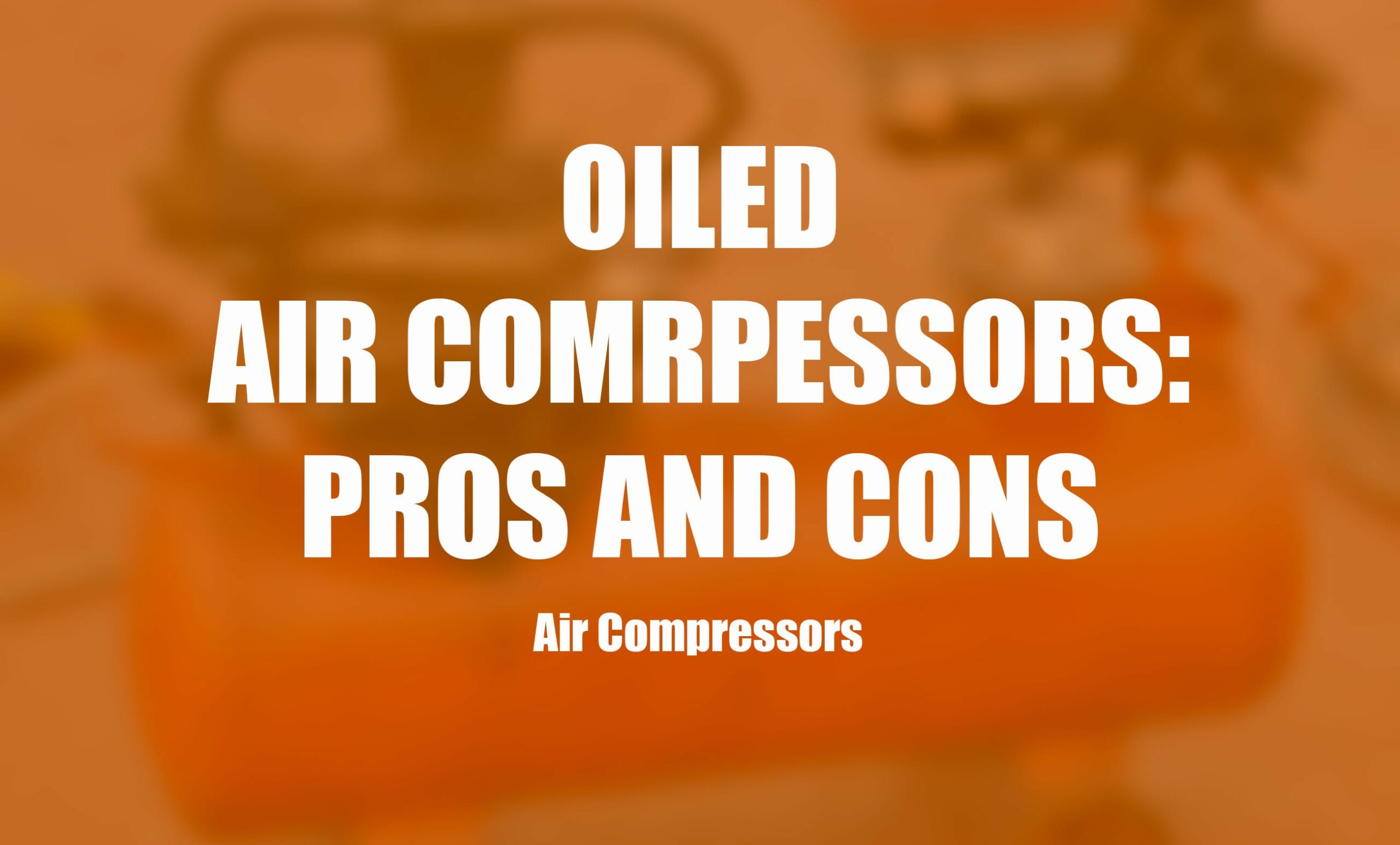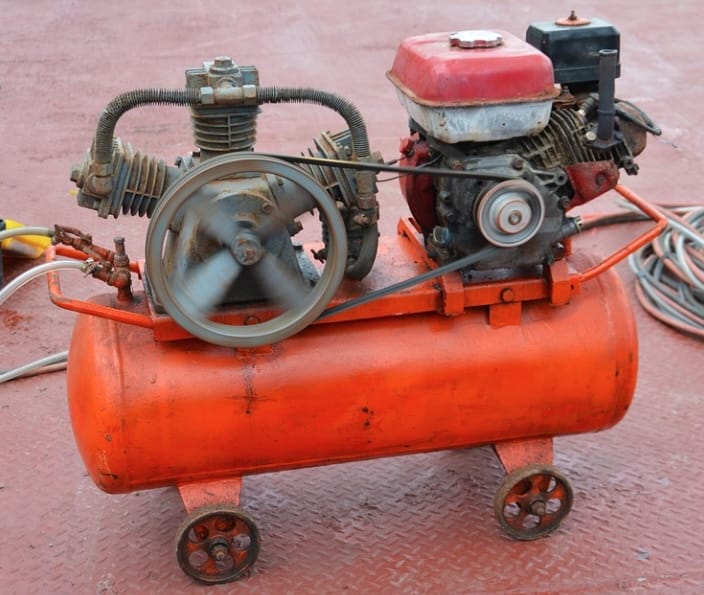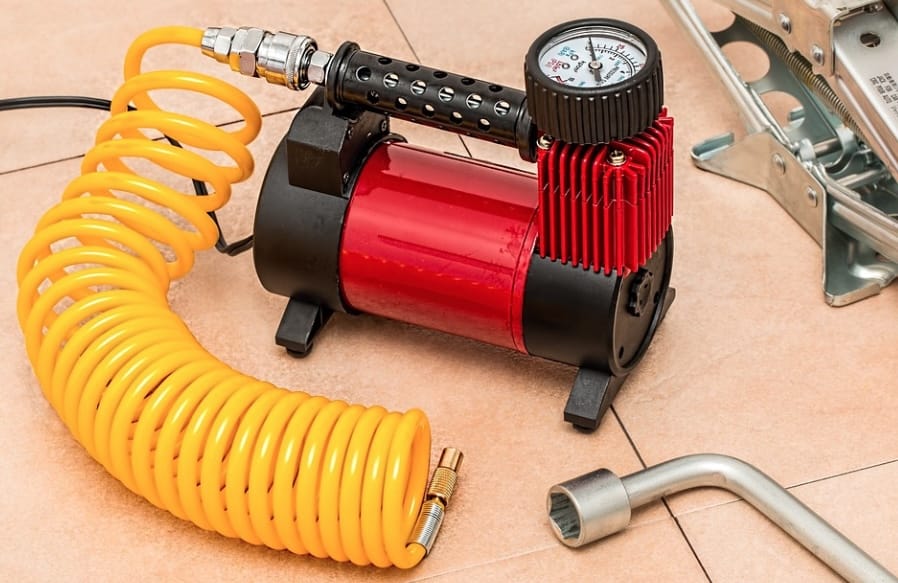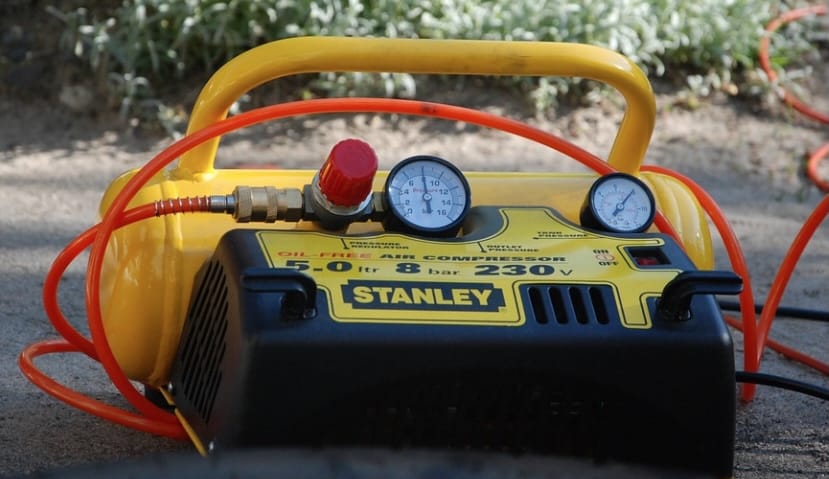I’m all about air compressors. Knowing that, it won’t surprise you how much it infuriates me to see the lack of information there is about these amazing tool accessories in the internet, particularly when it comes to oiled air compressors.
Taking a step back I realized that, instead of being mad, I should do my best and create a nice, in-depth article about the pros and cons of oil lubricated air compressors.
And that’s exactly what I did. So, prepare to learn about the advantages and disadvantages of these amazing types of air compressors and learn a few additional things too!
What are Oiled Air Compressors?
To be honest, most people don’t know much about air compressors in general, let alone oiled ones.
But don’t worry, I’m here to help you understand!
An oiled air compressor is exactly what it sounds like: an air compressor with oil lubricating the internal parts.
But why use oil?
Oiled air compressors have a number of advantages, one of which is that they are more durable and long-lasting. The oil protects the internal parts from wear and tear, allowing the compressor to run smoothly for a longer period of time.
So, who prefers oiled air compressors? Well, a lot of industries and professions do!
Automotive repair shops frequently use oiled air compressors because they require a long-lasting and efficient compressor that can withstand a high volume of repeated use (e.g. changing tires).
Similarly, manufacturers who use pneumatic tools, such as framing nailers, prefer oiled air compressors because they can withstand continuous use and demand.
Oiled Air Compressors Pros
Let’s first go about the advantages you get when you won an oiled air compressor:
Suited for Heavy Duty Applications
Let’s say you’re a metal fabricator and you need to run a lot of pneumatic tools, like impact wrenches or framing nailers.
These tools require a lot of air pressure to work properly, right?
So, what’s the solution? Enter: oiled air compressors. These bad boys are built to handle heavy use like a pro.
See, the oil lubricates the internal parts of the compressor, which helps protect them from damage caused by heavy and repeated use.
This means that an oiled air compressor is less likely to break down or need repairs, which is crucial when you’re working on a heavy application.
But wait, there’s more! Oiled air compressors are made with more powerful motors, which don’t have to work as hard to achieve higher levels of air pressure.
Plus, the oil helps to keep the compressor running at a lower temperature, which makes them more efficient.
Longer Lifespan
Nobody likes to waste money, especially when it comes to something as important as an air compressor.
But, let me tell you, there’s a solution to this potential problem and it’s called “oiled air compressor“.
These tools are known to be the most durable type of air compressor out there. But, why are they so durable you ask?
It’s all because their internal components are lubricated with oil. This may appear to be a minor detail, but it makes a significant difference.
The addition of oil to the mix reduces the compressor’s operating temperatures. Lower temperatures, as we all know, mean less wear and tear on the machinery. As a result, your air compressor will have a longer lifespan.
Run Quieter
Have you ever been stuck working next to an air compressor that sounds like a jet engine taking off?
It’s not only incredibly uncomfortable, but it can also be dangerous for your hearing as prolonged exposure to loud noise can lead to hearing loss, tinnitus, and other ear-related issues.
But, what if I told you there’s a solution to make your air compressor run a lot quieter? Enter oiled air compressors.
Oil lubricated air compressors use oil to lubricate the internal components, which helps to reduce friction and vibrations. This results in a smoother and quieter running machine.
Think about it like this: when you’re driving down the highway and you hear a car with a really loud engine, it’s probably because the engine isn’t well-oiled. But, when you hear a car with a smooth, quiet engine, it probably is well-oiled and running smoothly.
The same principle applies to air compressors.
So, if you’re looking for a way to make your work environment a little more pleasant and a lot less noisy, consider investing in an oiled air compressor. Your ears (and your coworkers’ ears) will thank you!
Cheaper
As a tradesperson, cost-effectiveness is likely a key consideration when choosing tools.
In the case of air compressors, an oil-lubricated model can provide a cost-effective solution.
These compressors are generally less expensive to purchase upfront compared to oil-free alternatives.
This is because oil-lubricated compressors tend to have simpler internal mechanisms and require fewer parts, which translates to a lower production cost and ultimately a more affordable price for the consumer.
Also, the fact that oil-lubricated compressors are more common in the market is one of the reasons that they tend to be cheaper than oil-free compressors.
Because they are more widely used and have been around for longer, manufacturers are able to produce them at a larger scale, which helps to keep costs down.
Oiled Air Compressors Cons
Now, let’s discuss what it’s not so great about oil air compressors:
Bulky and Heavy
If you’re a blue-collar worker, you’re probably used to working in different places every day.
Whether you’re a plumber, electrician or mechanic, you’re likely on the move constantly, going from job site to job site.
And, let’s be real, lugging around heavy equipment from one location to another can be a real hassle.
That’s where the problem with oiled air compressors comes in.
Oil-lubricated air compressors have more complex designs than oil-free compressors because they have additional components to facilitate the lubrication process.
These components include oil pumps, filters, and separators, which are necessary to ensure proper lubrication and cooling of the internal components.
These additional parts add to the overall weight of the compressor, making it fairly hard to be moved around.
Expensive to Maintain
While oiled compressors are typically less expensive to buy than oil-free compressors, the story changes when it comes to maintenance costs.
One of the most important things to remember about owning an oiled air compressor is that it requires regular maintenance. This includes tasks such as changing the oil, inspecting and replacing the oil filter, and checking the oil level.
These tasks, which typically cost $50 or more, must be performed at specific intervals to ensure the compressor is running efficiently and to avoid costly repairs down the road, and they can add up over time.
Air Pollution
One aspect of oiled compressors that is rarely discussed is the pollution they can cause in the surrounding air.
This is because oiled compressors use oil to lubricate and cool the internal components, which can cause small droplets of oil to escape and contaminate the surrounding air.
These droplets can be inhaled and cause health problems as well as environmental pollution.
So, if you’re thinking about buying an oiled air compressor, keep in mind that they can pollute the surrounding air. Furthermore, if you work in an industry with stringent air quality regulations, you should avoid using oiled compressors to avoid product contamination.
Best Oil Lubricated Air Compressor
Makita MAC700 Big Bore™ Oil Lubricated Air Compressor
Features
- Air pressure ratings: 3.3 CFM at 90 PSI
- Pump: Cast iron oil-lubricated pump
- Noise levels: Less than 80 decibels
If you’re looking for a solid choice of an oiled air compressor that will meet all your needs, then I’d suggest you take a look at this Makita MAC700 oil lubricated air compressor.
Thanks to its 2-horsepower motor the air compressor outputs 3.3 CFM at 90 PSI. That means it’s more than capable of handling even the heaviest of heavy-duty tasks (e.g. industrial sandblasting).
But it’s not just the motor that sets this compressor apart. The Makita MAC700 also has a long-lasting cast iron oil-lubricated pump with a large bore cylinder and piston, which allows the compressor to produce more compressed air, making it ideal for tough jobs.
And here’s the best part: this compressor operates at extremely low RPMs, producing less than 80 decibels of noise when in use. This is significantly quieter than most other compressors on the market.
This compressor is great for more than just its power and low noise level. The Makita MAC700 also has a roll bar handle, making it incredibly easy to maneuver. This is especially useful if you need to transport your compressor from job site to job site.
Pros
- 2-horsepower motor that outputs 3.3 CFM at 90 PSI
- Durable cast iron oil-lubricated pump with big bore cylinder and piston allows the compressor to generate more compressed air, making it more suitable for heavy-duty tasks
- Less than 80 decibels of noise when operating as it runs at really low RPMs
- Roll bar handle makes it very easy to be moved around
Cons
- Doesn’t have wheels
Frequently Asked Questions
Let’s give it a shot and try to answer all the questions that came up when writing this article about the pros and cons of oiled air compressors:
Are oiled compressors better?
The truth is, it depends on your specific needs and requirements.
Oiled compressors are great for heavy-duty tasks that require a lot of power, such as sandblasting or running heavy-duty pneumatic tools.
The oil lubrication helps to reduce friction in the internal components, which allows the compressor to run more smoothly and efficiently.
And, because they run at lower RPMs, they tend to be quieter than oil-free compressors.
However, oiled compressors require regular maintenance, including changing the oil and oil filter, which can be costly and time-consuming. Also, they can contaminate the air and aren’t suitable for industries with strict air quality regulations, such as the food and medical industry.
Which air compressor is best oil or oilless?
Again, it is dependent on your specific needs and specifications.
Oiled compressors are ideal for high-power tasks such as sandblasting or operating heavy-duty pneumatic tools.
The oil lubrication reduces friction in the internal components, allowing the compressor to run more smoothly and efficiently for a longer period of time.
They are also quieter than oil-free compressors because they run at lower RPMs.
Oil-free compressors, on the other hand, do not require regular oil changes and do not pollute the surrounding air. They are preferable for industries with stringent air quality regulations, such as the food and pharmaceutical industries, as well as for people who do not want the hassle of routine maintenance.
Furthermore, oil-free compressors are better suited for light-duty tasks like powering small pneumatic tools and are ideal for personal or home use. They’re also a better choice for people with limited space because they’re smaller and lighter than oiled compressors.
Should you oil an air compressor?
The answer is, it depends on the type of compressor you have.
If you have an oil-lubricated air compressor, then hell yeah, it’s important to use oil to lubricate the internal components.
This oil helps to reduce friction and keep the compressor running smoothly and efficiently. Without oil, the compressor can experience damage and wear down quickly.
However, if you have an oil-free air compressor, you should not use oil.
These compressors are designed to run without oil and using oil can cause damage to the internal components.
How long do oil air compressors last?
It depends on a few factors such as usage, maintenance, and quality of oil used. But on average, oiled units typically last for up to 15,000 hours.
That’s a pretty long time!
One of the main reasons for this durability is that the oil lubrication helps to reduce friction in the internal components, which allows the compressor to run more smoothly and efficiently.




